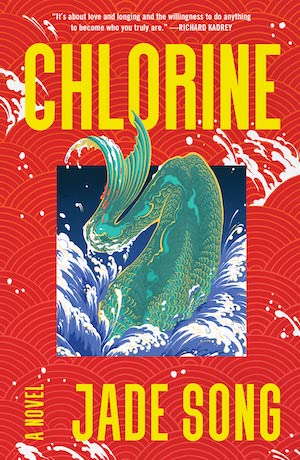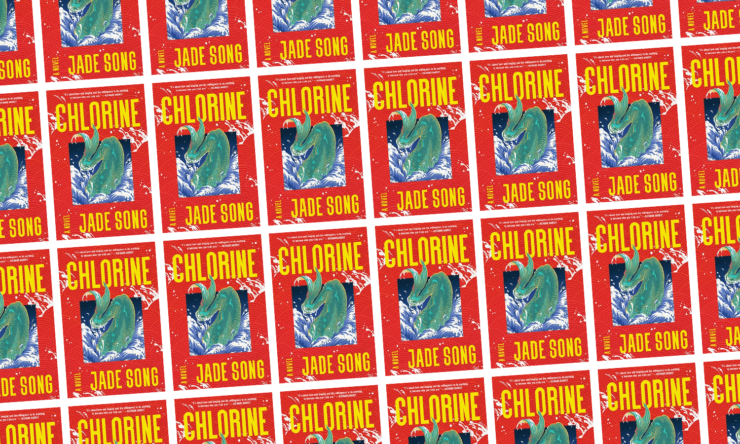From the moment that four-year-old Ren Yu receives a book of mermaid folklore from her mother, she’s captivated—but not by any “G-rated” fairytale or sanitized Disney romance. Instead, she pores over darker legends, of the Chinese goddess Nüwa, who created humankind out of yellow clay to sate her loneliness; of the Passamaquoddy mermaids, who transformed into water snakes to mock and elude the discipline of moralist men. Then, three years later, when at swim team tryouts, Ren dives into the pool under the despotic gaze of coach Jim, she finds herself unwittingly plunged into the unique problematics that the figure of the mermaid poses—neither human nor monster, captured nor free. Both powerful and used.
Less coming-of-age story than an acute treatise on transformation, Chlorine follows Ren through the arduous journey of cleaving herself and her body to the exacting standards of elite athleticism. Immediately set apart from her white teammates as the child of an immigrant family, Ren has the wrong kind of swimsuit, a Tupperware of cut grapes, and an “unpronounceable” name. But she’s indelibly pulled towards the water, the seamless sense of belonging she feels within it, and it’s this eager tenacity that endears her to swim coach Jim. Naturally, Ren begins to crave his attention, but Coach Jim’s borderline abusive whims and tempers often mean he pushes Ren and her teammates past their limits.
Chlorine is exceptional at rendering Ren’s impulse towards high achievement in all its lurid, contradictory fullness. It would be easy to reduce that impulse to a symptom of her Chinese upbringing, her mother’s wish for her to clinch an Ivy League scholarship. It would be simple to see it as a means of Ren’s adolescent desire to please authority figures such as Coach Jim and his desire for “second-hand glory,” or her father, who moves back to China and promises to return “as soon as [Ren] go[es] under a minute in the 100 freestyle.” But Ren deeply savors the competitive, often vicious jostling for dominance within her swim team; actively seeks masochistic pleasure in her changing body as she trains. And informed as these satisfactions might be by the expectations and selfish projections of the adults in her life, they are not entirely imposed. Ren is not pitiable. Her indefatigable drive is not singular so much as a complex and tentacled beast of her own making. Desire, vengeance, ambition—each element buttressing and negating another, so it’s impossible to separate her own agency from manipulation, control from submission, individuation from her will to fit in.
Buy the Book


Chlorine
And yet, Ren isn’t interested in resolving these contradictions so much as they manifest into her singular yearning to adapt herself into the ideal of mermaid. For Ren, the pool is everything. She imagines herself as thriving in chlorine. Shedding the weaknesses of a sloppy human body to reveal iridescent scale. Can you blame her? “Mermaids are not born, we are made,” she says, with religious fervor. And given her training—brutal if only to make her tougher and faster; painful if only to escape regular old “pain due to the agony of everyday human life,” it becomes clear that her becoming-mermaid is not a naïve fantasy or a grotesque, disfiguring fate.
When Ren finally gains a tail and transcends her human form, it is simply the most logical conclusion.
Spoilers follow.
What feels unique about Chlorine is that it’s told not in the present, but from the future, by a mermaid Ren who has already shed her “pain… from remaining human.” Song writes in a prosaic style that is blunt and confessional while still strikingly detached. It’s clear from the outset that Ren is not speaking from the familiar perspective of an outsider Asian teen, but also as an immortally higher being. “Nearly every human memory is corrupted by the fact that it is a memory of being human,” she tells us in a contemptuous aside, refuting cultural assumptions of the mermaid as powerless, or ashamed of their physiological difference.
Indeed, much like the folktales that Ren relishes and recounts, the archetypal plainness of Song’s language is unsettling. It resists both realist and sentimentalizing narratives of girlhood, in favor of foregrounding what’s brash, abject, even comic about Ren’s high school experience—the gross, bleeding heart of it. For example, Ren’s best friendship with her teammate Cathy is not cemented with a Claire’s bracelet, but via a homoerotic incident in the girls’ bathroom, Ren desperate to get a tampon in so she can compete, and Cathy conscripted to shove it up her. Ren’s menstrual blood ends up in her own mouth, crimson over Cathy’s white hands—“it was impossible to stick a hand up a bloody vagina and not fall in love with its owner.” When Ren sexually experiments with Brad, a boy on the team, his “dick remind[s] [her] of the Chinese eggplants [her] mother used in cooking.” She imagines cutting his dick into chunks and boiling it. After all, “[her] mother’s cooking tasted better than he did.”
Obviously, there’s a lot of cringey delight and humor to be found in the body horror of just uh… existing as a teenager that Song revels in. But adolescence here is also depicted as a travail of spirit, particularly in accounts of swim training, an existentially consuming state that requires bodily sacrifice to the point of mutilation—“a natural course of action to reach peak condition. Shaving every ounce of body hair, a calorie-controlled diet, refusing feminine beauty for the optimized development of muscle. These shared rituals create a pack mentality for the team that evokes both heady camaraderie and social turmoil. Stylistically, Song’s integration of the high mythic and base horror suits these high school melodramas, but it does also mean that she misses a few opportunities to fully round out the quieter, emotional subtleties of Ren’s experience.
High school grotesquerie aside, there are other speculative elements in Chlorine that veer into the realm of true horror. After all, the mermaid as we know her is a monstrous paradox. She is victim to heteronormative romance, yet a paragon of feminine sexuality, inspiring countless sailors to dash themselves over the rocks. She is unnatural but an innocent; not a child, but she will never be an adult woman. And it’s exactly this paradox that imbues Ren with a frightening volatility, her body and consciousness transfiguring across the novel via a series of Cronenberian mutations. During a trip to the ER, she sees not people waiting to be treated, but a surreal landscape of human-sea-creature-hybrids stabbed with tridents and bleeding from fins. It’s unclear how dangerous Ren might become to herself or others, the threat of her feels, in moments, very real. That said, it’s also clear that monstrousness, for Song, is valued—there’s something compellingly Frankensteinian about Ren’s striving towards a kind of inhuman self-creation that begets a queer sensibility.
Indeed, when Ren’s father leaves the country to return to China, dissatisfied with the feeling of being-alien, Ren “trie[s] to convince him that aliens [are] more captivating than human beings.” This sense of confidence in the nonnormative is refreshingly natural to Ren and permeates the book. Even when white teammates bully her for her difference, and Ren sometimes feels pressure to assimilate, she never questions her love of Faye Wong or the egg rolls her mother buys from Costco. Similarly, Ren’s unwavering assertion that she is a mermaid feels queer in that she is insisting on existing as something impossible, in the process scrambling conventional narratives of whiteness, heterosexuality, neurotypicality and bodily ideals—she “dream[s] myths larger than my girl body c[an] hold.”
But Chlorine isn’t entirely affirmative either. Over the course of the book, Ren begins to struggle with elite athleticism’s pressure. Listless after a concussion, she gets into weed and suffers a pregnancy scare. Her codependent friendship with Cathy becomes fickle when boys enter the picture, and she has recurring troubles returning to practice. After a humiliating incident being disqualified at a swim meet, Ren does manage to recommit herself to not just swimming, but winning, and this time, with a dedication that is recognizably manic.
The final result of this is that Ren does earn her tail, but not by any supernatural force. Instead, she sews her legs together in a climactic scene that is Song’s writing at its most revulsive and sumptuous. Crucially, this moment is described not merely as a visceral account of physical extremity, but as a prolonged, psychically sublime process that forces us to consider how freedom and punishment are perhaps inextricable. How what we want to believe will unfetter us might never be totally distinct from the violent forces of the world; but is tainted too, and therefore has a shredded, carnal beauty.
Turning the possibility of pure empowerment on its head, Song forces us to question Ren’s reliability as a narrator at the same time as she provocatively suggests that the truth is perhaps, irrelevant. What’s more important is that in Chlorine, Ren gets to write her own myth—what Fredric Jameson (by way of Claude Lévi-Strauss) once called “the imaginary resolution of a real contradiction”—that she can bridge the aporia of her life on her own terms. And what we’re left with is an aching siren song, one that points us towards those uncharted dimensions of desire and identity that swim and shimmer, in and out of being.
Chlorine is published by William Morrow.
Trisha Low is the author of The Compleat Purge (Kenning Editions, 2013) and Socialist Realism (Emily Books, 2019). She lives in the East Bay of California.










